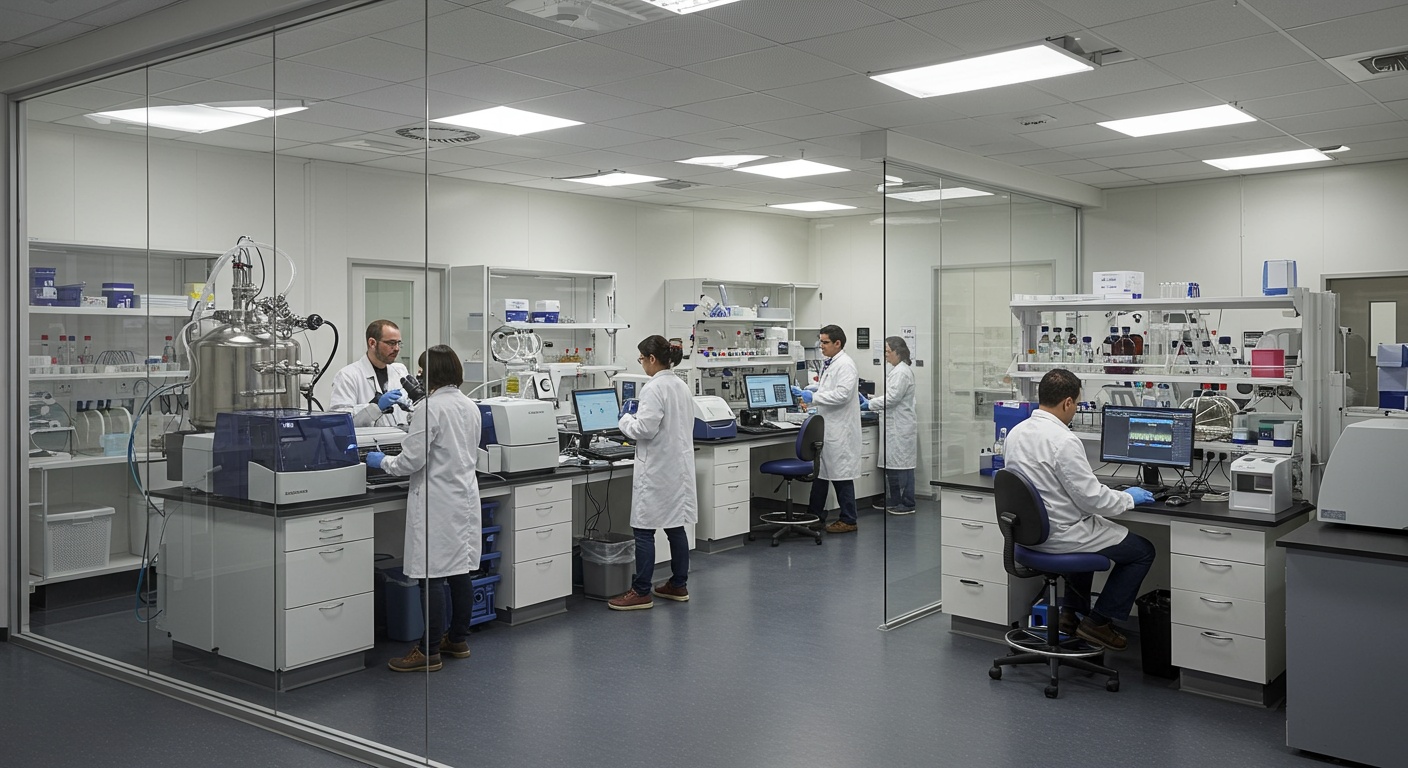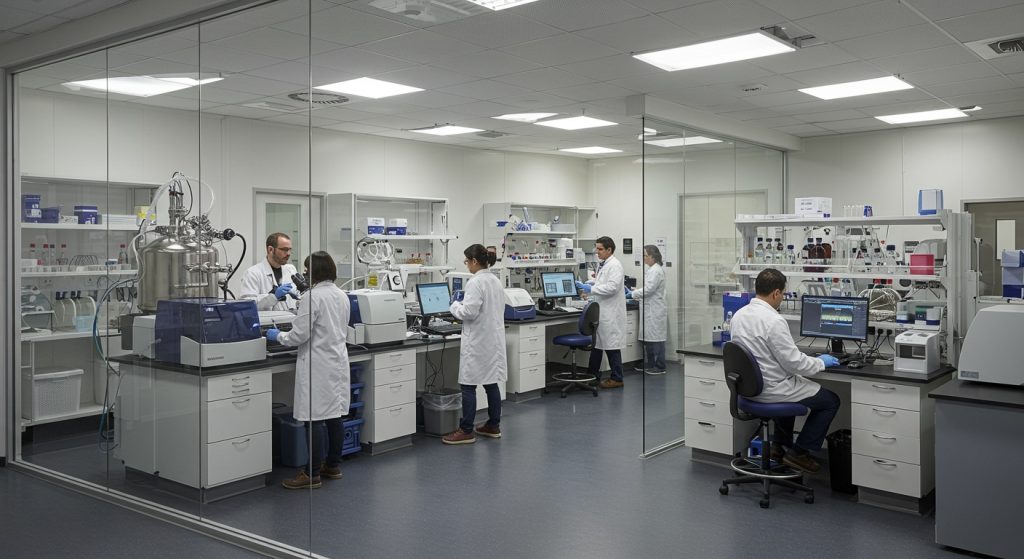Australia’s biotechnology sector is experiencing rapid growth, fuelled by research breakthroughs in areas like CRISPR gene editing and CAR T-cell therapy. This expansion necessitates skilled professionals, driving demand for advanced biotechnology education. Several Australian institutions are rising to meet this need, offering programs designed to equip graduates with the knowledge and skills to thrive. We will explore institutions that are leading the way in Australian biotech education, assessing their unique strengths. We will investigate their curriculum focuses, industry partnerships. Research opportunities. Grasp which programs are providing students with the cutting-edge expertise required to navigate this dynamic and vital field.

Understanding Biotechnology: A Primer
Biotechnology, at its core, harnesses biological systems, living organisms, or parts thereof to develop or create different products. This field is incredibly broad, encompassing everything from brewing beer (a traditional application) to developing cutting-edge gene therapies. Modern biotechnology relies heavily on techniques like:
- Genetic Engineering: Modifying an organism’s DNA to introduce new traits or enhance existing ones. This often involves using enzymes to cut and paste DNA sequences.
- Recombinant DNA Technology: Combining DNA from different sources to create novel genetic combinations. This is crucial for producing proteins like insulin in bacteria.
- Cell Culture: Growing cells in a controlled environment for research or production purposes. This is essential for developing vaccines and biopharmaceuticals.
- Genomics: Studying the entire genome of an organism, providing insights into gene function and disease mechanisms.
- Proteomics: Analyzing the complete set of proteins produced by an organism, offering a deeper understanding of cellular processes.
These technologies are applied across diverse sectors, including healthcare (developing new drugs and diagnostics), agriculture (creating genetically modified crops). Environmental science (bioremediation of pollutants).
The University of Queensland (UQ)
UQ consistently ranks among the top universities globally and boasts a strong biotechnology program, particularly within its Faculty of Science and the Australian Institute for Bioengineering and Nanotechnology (AIBN).
Key Strengths:
- Research Focus: UQ excels in research areas such as vaccine development, drug discovery. Agricultural biotechnology. They are known for translating research into practical applications.
- Infrastructure: The AIBN provides state-of-the-art facilities, including advanced imaging, genomics. Proteomics platforms.
- Industry Collaboration: UQ actively collaborates with industry partners, providing students with opportunities for internships and real-world experience.
- Specific Programs: Offers Bachelor of Biotechnology, Master of Biotechnology. PhD programs in related fields.
Real-World Application: UQ researchers have been at the forefront of developing molecular clamp technology for vaccine development, which has been used to create vaccines for diseases like COVID-19.
Monash University
Monash University, located in Melbourne, is another leading institution in Australia for biotechnology. Its strengths lie in its interdisciplinary approach and focus on translational research.
Key Strengths:
- Interdisciplinary Approach: Monash combines expertise from different faculties, including science, engineering. Medicine, to address complex biotechnology challenges.
- Drug Discovery and Development: Strong emphasis on developing new therapeutics for diseases like cancer and infectious diseases.
- Stem Cell Research: Monash is a leader in stem cell research, with applications in regenerative medicine.
- Specific Programs: Offers Bachelor of Science (majoring in Biotechnology), Master of Biotechnology. PhD programs.
Real-World Application: Monash researchers are actively involved in developing novel cancer therapies, including immunotherapies that harness the power of the immune system to fight cancer cells.
The University of Melbourne
The University of Melbourne has a prominent position in biotechnology, particularly through its Bio21 Institute. This institute brings together researchers from diverse disciplines to tackle crucial biomedical challenges.
Key Strengths:
- Bio21 Institute: A dedicated research institute with state-of-the-art facilities and a collaborative environment.
- Focus on Biomedical Research: Strong emphasis on understanding disease mechanisms and developing new treatments.
- Agricultural Biotechnology: Research in improving crop yields and developing sustainable agricultural practices.
- Specific Programs: Offers Master of Biotechnology, Master of Biomedical Science. PhD programs.
Real-World Application: The University of Melbourne is involved in developing new diagnostics for infectious diseases, allowing for rapid and accurate detection of pathogens.
The University of New South Wales (UNSW)
UNSW, located in Sydney, is recognized for its strengths in engineering and science, which translates into a robust biotechnology program.
Key Strengths:
- Engineering Focus: UNSW excels in applying engineering principles to biotechnology, such as developing bioreactors and biosensors.
- Synthetic Biology: Active research in synthetic biology, designing and building new biological systems for various applications.
- Environmental Biotechnology: Developing solutions for environmental problems using biological processes.
- Specific Programs: Offers Bachelor of Science (majoring in Biotechnology), Master of Biotechnology. PhD programs.
Real-World Application: UNSW researchers are working on developing biodegradable plastics using microbial fermentation, offering a sustainable alternative to traditional plastics. Top Universities in Germany for Biotechnology Research offer comparable programs.
Comparing the Institutions
While all these institutions offer strong biotechnology programs, they have distinct strengths:
| Institution | Key Strengths | Focus Areas |
|---|---|---|
| University of Queensland | Vaccine development, drug discovery, agricultural biotechnology, infrastructure. | Translational Research, Molecular Clamp Technology. |
| Monash University | Interdisciplinary approach, drug discovery, stem cell research. | Cancer therapies, regenerative medicine. |
| University of Melbourne | Bio21 Institute, biomedical research, agricultural biotechnology. | Disease diagnostics, crop improvement. |
| University of New South Wales | Engineering focus, synthetic biology, environmental biotechnology. | Bioreactors, biodegradable plastics. |
Career Opportunities in Biotechnology
A degree in biotechnology opens doors to a wide range of career paths, including:
- Research Scientist: Conducting research in academic or industry settings.
- Biopharmaceutical Manufacturing: Producing biopharmaceuticals, such as vaccines and antibodies.
- Quality Control/Assurance: Ensuring the quality and safety of biotechnology products.
- Regulatory Affairs: Navigating the regulatory landscape for biotechnology products.
- Science Communication: Communicating scientific details to the public.
- Bioinformatics: Analyzing large biological datasets.
The biotechnology industry is constantly evolving, creating new and exciting opportunities for skilled graduates.
Conclusion
Australia’s biotechnology landscape is thriving, fueled by world-class institutions and cutting-edge research. The journey towards becoming a biotechnology leader requires more than just academic excellence; it demands a strategic vision that bridges the gap between research and real-world application. Approach 5: ‘The Success Blueprint’ Key takeaways from exploring these leading institutions highlight the importance of fostering interdisciplinary collaboration, securing robust funding. Nurturing entrepreneurial skills within the scientific community. Success hinges on establishing strong partnerships between universities and industry, creating a pipeline for translating groundbreaking discoveries into marketable solutions. To effectively implement these principles, aspiring biotech leaders should prioritize networking, seeking mentorship from experienced professionals. Actively participating in industry events. Staying informed about emerging trends, such as personalized medicine and biomanufacturing, is crucial. Ultimately, the success of Australia’s biotechnology sector depends on the collective effort to cultivate innovation, embrace risk-taking. Champion the transformative potential of biotechnology to improve human health and well-being. Remember, the future of biotechnology is not just about scientific advancements but about our ability to translate those advancements into meaningful impact.
FAQs
So, which universities are really good if I want to study biotechnology in Australia?
Okay, if you’re looking for the cream of the crop, you’ll want to check out places like the University of Melbourne, the University of Queensland, Monash University. The University of Sydney. They all have strong reputations, excellent research facilities. Attract top professors.
What kind of programs do these top universities offer in biotechnology, specifically?
Generally, you’ll find a range! Think Bachelor’s degrees in Biotechnology, Science with a major in Biotechnology. Then postgraduate options like Master’s degrees (by coursework or research) and PhDs. Some might even have specialized programs focusing on areas like agricultural biotechnology or medical biotechnology.
I’m more interested in the practical side of things. Do any of these unis have strong industry connections for internships or jobs?
Absolutely! That’s a key thing to look for. Universities like Monash and the University of Queensland, in particular, are known for their strong ties to the biotech industry. They often have research collaborations with companies and offer opportunities for students to gain real-world experience through internships and placements.
Are there universities outside of the ‘big name’ ones that are worth considering for biotechnology?
Definitely! Don’t just focus on the big guns. Places like the University of Adelaide, the University of Technology Sydney (UTS). RMIT University also have solid biotechnology programs. They might be a good fit if you’re looking for something a bit different or want to specialize in a particular area.
What about research opportunities? I’d love to get involved in some cutting-edge stuff!
Great question! The universities I mentioned earlier all have vibrant research environments. Look into the specific research groups and labs within their biotechnology departments. Areas like genomics, proteomics, drug discovery. Biomanufacturing are usually well-represented. Check out their websites to see what projects are currently underway.
Okay, last one! What should I really be looking at when deciding which uni is best for me?
Honestly? Think about your interests! What area of biotechnology excites you the most? Then, research which universities have strong programs and research labs in that area. Look at the course curriculum, the faculty’s expertise. The opportunities for practical experience. And don’t forget to consider things like location and cost of living!



